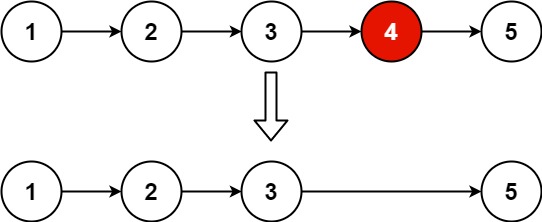Fuck LeetCode > Linked List > 19. Remove Nth Node From End of List > Solved in Java, Python, C++, JavaScript, C#, Go, Ruby > Repost or Contribute
LeetCode link: 19. Remove Nth Node From End of List, difficulty: Medium.
Given the head of a linked list, remove the nth node from the end of the list and return its head.
Example 1:

Input: head = [1,2,3,4,5], n = 2
Output: [1,2,3,5]
Example 2:
Input: head = [1], n = 1
Output: []
Example 3:
Input: head = [1,2], n = 1
Output: [1]
Constraints:
- The number of nodes in the list is
sz. 1 <= sz <= 300 <= Node.val <= 1001 <= n <= sz
Hint 1
Maintain two pointers and update one with a delay of n steps.
Intuition
- Deleting the nth to last node in the linked list is equivalent to deleting the (node_count - n)th node in the linked list.
- First find out
node_count. - When
index == node_count - n, delete the node bynode.next = node.next.next. - Since the deleted node may be
head, a virtual nodedummy_nodeis used to facilitate unified processing.
Steps
First find out
node_count.node_count = 0 node = head while node node_count += 1 node = node.next endWhen
index == node_count - N, delete the node bynode.next = node.next.next.index = 0 node = head while node if index == node_count - n node.next = node.next.next break end index += 1 node = node.next endSince the deleted node may be
head, a virtual nodedummy_nodeis used to facilitate unified processing.dummy_head = ListNode.new # 1 dummy_head.next = head # 2 node = dummy_head # 3 # omitted code return dummy_head.next
Complexity
Time complexity
O(N)
Space complexity
O(1)
Java #
/**
* public class ListNode {
* int val;
* ListNode next;
* ListNode() {}
* ListNode(int val) { this.val = val; }
* ListNode(int val, ListNode next) { this.val = val; this.next = next; }
* }
*/
class Solution {
public ListNode removeNthFromEnd(ListNode head, int n) {
var nodeCount = 0;
var node = head;
while (node != null) {
nodeCount++;
node = node.next;
}
var index = 0;
var dummyHead = new ListNode(0, head);
node = dummyHead;
while (node != null) {
if (index == nodeCount - n) {
node.next = node.next.next;
break;
}
index++;
node = node.next;
}
return dummyHead.next;
}
}
Python #
# Definition for singly-linked list.
# class ListNode:
# def __init__(self, val=0, next=None):
# self.val = val
# self.next = next
class Solution:
def removeNthFromEnd(self, head: Optional[ListNode], n: int) -> Optional[ListNode]:
node_count = 0
node = head
while node:
node_count += 1
node = node.next
index = 0
dummy_head = ListNode(next=head)
node = dummy_head
while node:
if index == node_count - n:
node.next = node.next.next
break
index += 1
node = node.next
return dummy_head.next
C++ #
/**
* Definition for singly-linked list.
* struct ListNode {
* int val;
* ListNode *next;
* ListNode() : val(0), next(nullptr) {}
* ListNode(int x) : val(x), next(nullptr) {}
* ListNode(int x, ListNode *next) : val(x), next(next) {}
* };
*/
class Solution {
public:
ListNode* removeNthFromEnd(ListNode* head, int n) {
auto node_count = 0;
auto node = head;
while (node != nullptr) {
node_count += 1;
node = node->next;
}
auto index = 0;
auto dummy_head = new ListNode(0, head);
node = dummy_head;
for (auto i = 0; i < node_count - n; i++) {
node = node->next;
}
auto target_node = node->next;
node->next = node->next->next;
delete target_node;
auto result = dummy_head->next;
delete dummy_head;
return result;
}
};
JavaScript #
/**
* function ListNode(val, next) {
* this.val = (val===undefined ? 0 : val)
* this.next = (next===undefined ? null : next)
* }
*/
var removeNthFromEnd = function (head, n) {
let nodeCount = 0
let node = head
while (node != null) {
nodeCount++
node = node.next
}
let index = 0
let dummyHead = new ListNode(0, head)
node = dummyHead
while (node != null) {
if (index == nodeCount - n) {
node.next = node.next.next
break
}
index++
node = node.next
}
return dummyHead.next
};
C# #
/**
* Definition for singly-linked list.
* public class ListNode {
* public int val;
* public ListNode next;
* public ListNode(int val=0, ListNode next=null) {
* this.val = val;
* this.next = next;
* }
* }
*/
public class Solution
{
public ListNode RemoveNthFromEnd(ListNode head, int n)
{
int nodeCount = 0;
var node = head;
while (node != null)
{
nodeCount++;
node = node.next;
}
int index = 0;
var dummyHead = new ListNode(0, head);
node = dummyHead;
while (node != null)
{
if (index == nodeCount - n)
{
node.next = node.next.next;
break;
}
index++;
node = node.next;
}
return dummyHead.next;
}
}
Go #
/**
* Definition for singly-linked list.
* type ListNode struct {
* Val int
* Next *ListNode
* }
*/
func removeNthFromEnd(head *ListNode, n int) *ListNode {
nodeCount := 0
node := head
for node != nil {
nodeCount++
node = node.Next
}
index := 0
dummyHead := &ListNode{0, head}
node = dummyHead
for node != nil {
if index == nodeCount - n {
node.Next = node.Next.Next
break
}
index++
node = node.Next
}
return dummyHead.Next
}
Ruby #
# class ListNode
# attr_accessor :val, :next
#
# def initialize(val = 0, _next = nil)
# @val = val
# @next = _next
# end
# end
def remove_nth_from_end(head, n)
node_count = 0
node = head
while node
node_count += 1
node = node.next
end
index = 0
dummy_head = ListNode.new(0, head)
node = dummy_head
while node
if index == node_count - n
node.next = node.next.next
break
end
index += 1
node = node.next
end
dummy_head.next
end



